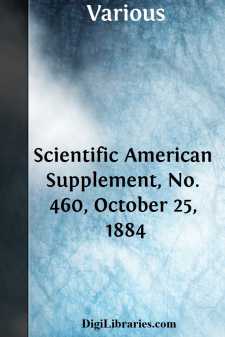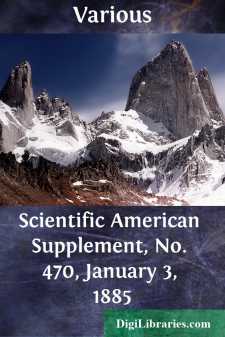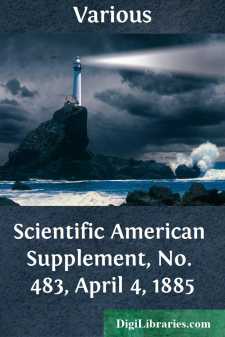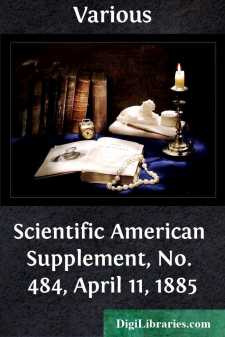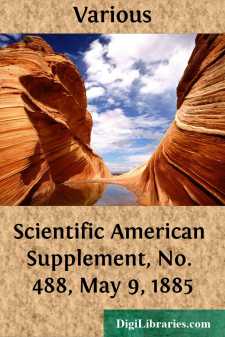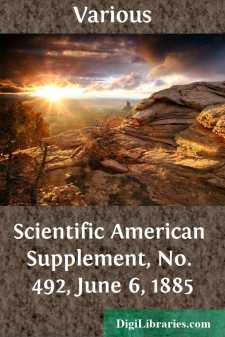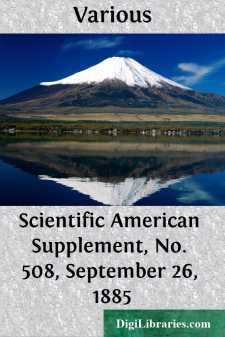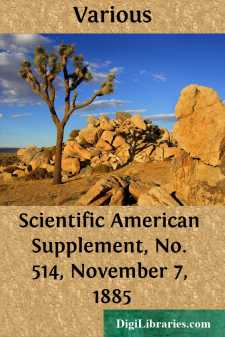Periodicals
- Art 27
- Children's periodicals 59
- Entertainment 5
- Food/Wine 2
- Games/Humor 455
- General 661
- Health 1
- History 53
- House/Home 1
- Regional 62
- Science/Nature
- Transportation 10
Science/Nature Books
Sort by:
by:
Various
LINKS IN THE HISTORY OF THE LOCOMOTIVE. It is, perhaps, more difficult to write accurate history than anything else, and this is true not only of nations, kings, politicians, or wars, but of events and things witnessed or called into existence in every-day life. In The Engineer for September 17, 1880, we did our best to place a true statement of the facts concerning the Rocket before our readers. In...
more...
by:
Various
IRON PILE PLANKS IN THE CONSTRUCTION OF FOUNDATIONS UNDER WATER. The annexed engravings illustrate a method of constructing subaqueous foundations by the use of iron pile planks. These latter, by reason of their peculiar form, present a great resistance, not only to the vertical blow of the pile driver (as it is indispensable that they should), but also to horizontal pressure when excavating is being...
more...
by:
Various
THE RIGHI RAILROAD. In the year 1864, the well-known geographer, Heinrich Keller, from Zurich, on ascending to the summit of the Righi Mountain, in the heart of Switzerland, discovered one of the finest panoramic displays of mountain scenery that he had ever witnessed. To his enthusiastic descriptions some lovers of nature in Zurich and Berne listened with much interest, and in the year 1865, Dr. Abel,...
more...
by:
Various
THEODOR BILLROTH, PROFESSOR OF SURGERY AT VIENNA. The well known surgeon, Theodor Billroth, was born on the island of Rügen in 1829. He showed great talent and liking for music, and it was the wish of his father, who was a minister, that he should cultivate this taste and become an artist; but the great masters of medicine, Johannes Mueller, Meckel v. Hemsbach, R. Wagner, Traube, and Schönlein, who...
more...
by:
Various
TORPEDO SHIPS. Commander Gallwey lately delivered an interesting lecture on the use of torpedoes in war before the royal U.S. Institution, London, discussed H.M.S. Polyphemus, and urged as arguments in her favor: 1. That she has very high speed, combined with fair maneuvering powers. 2. That she can discharge her torpedoes with certainty either ahead or on the beam when proceeding at full speed. 3....
more...
by:
Various
A VISIT TO THE CREUSOT WORKS. Here we are at the great forge (Fig. 1), that wonderful creation which has not its like in France, that gigantic construction which iron has wholly paid for, and which covers a space of twenty-four acres. We first remark two puddling halls, each of which contains 50 furnaces and 9 steam hammers. It is in these furnaces that the iron is puddled. The ball or bloom thus...
more...
by:
Various
NEW SPANISH ARTILLERY. The Spanish Government is now engaged in supplying some of its principal fortifications with heavy guns of the most improved construction. The defenses of Cadiz and Ceuta have been greatly strengthened in this respect. The most recent additions are some very powerful Krupp guns for the fortress of Isabel II., at Mahon. NEW KRUPP BREECH LOADING GUNS FOR SPANISH FORTIFICATIONS....
more...
by:
Various
FOUNDATIONS IN QUICKSAND. Foundations in quicksand often have to be built in places where least expected, and sometimes the writer has been able to conveniently span the vein with an arch and avoid trouble; but where it cannot be conveniently arched over, it will be necessary to sheath pile for a trench and lay in broad sections of concrete until the space is crossed, the sheath piling being drawn and...
more...
by:
Various
The use of electricity in the reduction of metals from their ores is extending so rapidly, and the methods of its generation and application have been so greatly improved within a few years, that the possibility of its becoming the chief agent in the metallurgy of the future may now be admitted, even in cases where the present cost of treatment is too high to be commercially advantageous. The refining...
more...
by:
Various
ROMAN REMAINS AT LEICESTER, ENGLAND. The Roman tessellated pavement in Jewry Wall Street, Leicester, discovered in the year 1832, is well known to archaeologists; it has also been known as difficult of access, and hardly to be seen in a dark cellar, and, in fact, it has not been seen or visited, except by very few persons. Some time ago the Town Council resolved to purchase the house and premises, with...
more...


